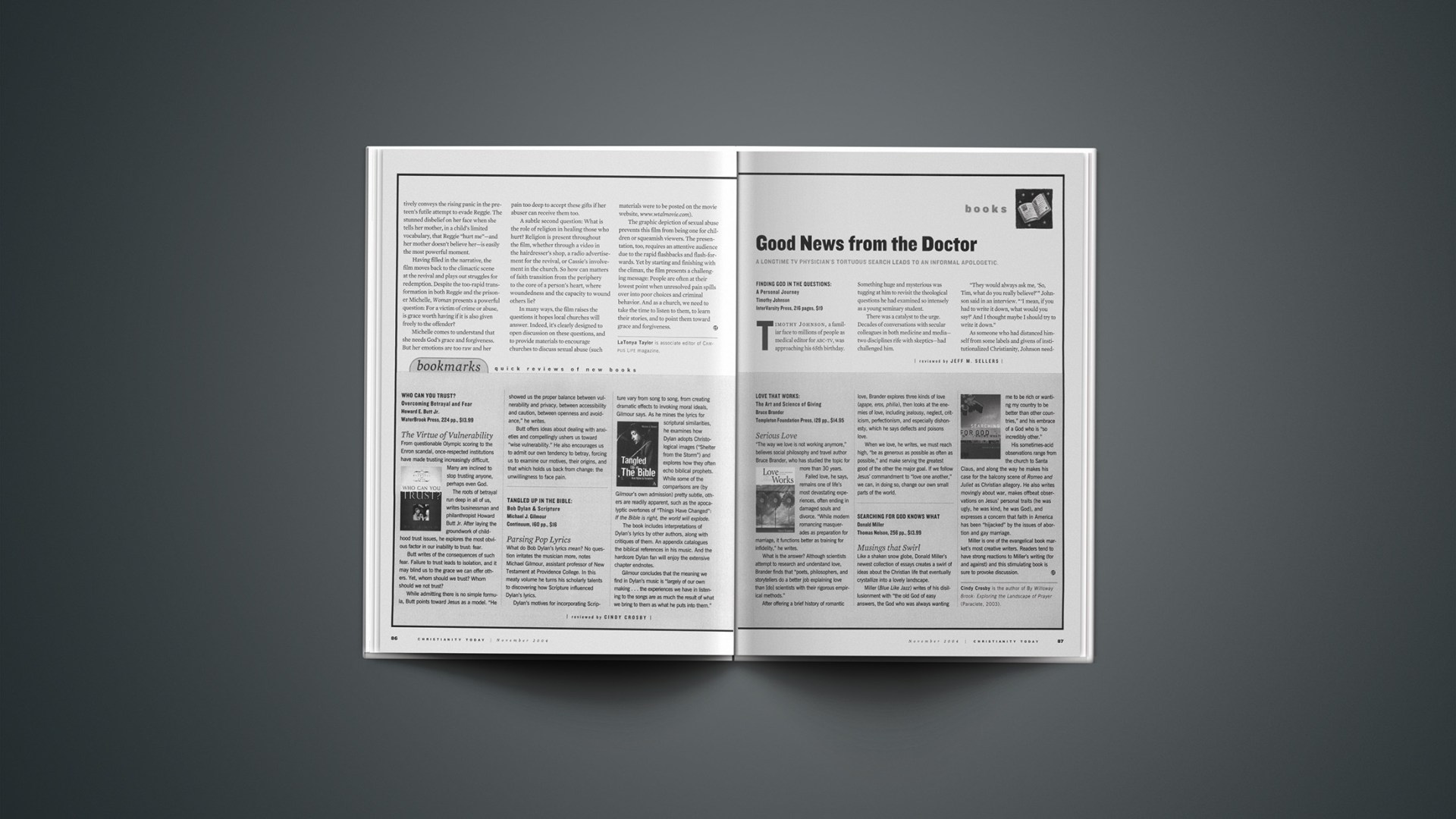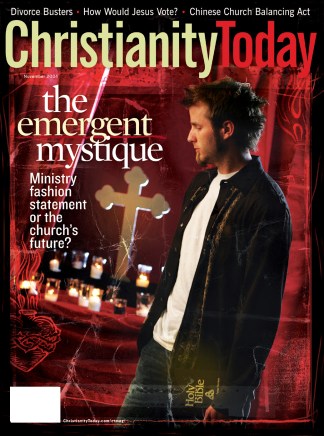Timothy Johnson, a familiar face to millions of people as medical editor for ABC-TV, was approaching his 65th birthday. Something huge and mysterious was tugging at him to revisit the theological questions he had examined so intensely as a young seminary student.
There was a catalyst to the urge. Decades of conversations with secular colleagues in both medicine and media—two disciplines rife with skeptics—had challenged him.
“They would always ask me, ‘So, Tim, what do you really believe?'” Johnson said in an interview. “‘I mean, if you had to write it down, what would you say?’ And I thought maybe I should try to write it down.”
As someone who had distanced himself from some labels and givens of institutionalized Christianity, Johnson needed to explain, as much to himself as to others, what he believed. The result was a book that quickly found its way into The New York Times top 10 Hardcover Advice Bestseller List.
That’s the Advice list, not the religious list; neither Johnson nor IVP aimed the book at the Christian market. Yet Finding God in the Questions amounts to an informal apologetic.
An informal apologetic, sales indicate, is just what the doctor ordered for postmodern masses. Johnson does not pretend to present anything more than his mortal quest—no overweening, absolute truth claims here—an earthy endeavor well-suited to his engaging, self-effacing tone. Something curious happens along the way. The gospel comes ringing through, gently as a bell choir.
Can a gospel without any overweening truth claims be any good? Consider Johnson on his own terms. A would-be clergyman who opted instead for medicine, his concerns go beyond the eternal destiny of hidden tribes who have never heard of Jesus.
First, he takes on the existence of God. His casual voice takes nothing away from the integrity of his inquiry into origins, human nature, and how they point toward a personal Creator. After mentioning the Copernican revolution, for example, he writes that it is no longer significant that the Earth is not considered the astronomical center of the universe, as the cosmos has no spatial center.
“Our apparently insignificant place in the universe turns out to be quite ideal for the development of our species,” he adds. “In fact, contemporary science is telling us that it takes a universe as large and as long in the making as ours to allow for the development of the precise conditions necessary for life such as ours.”
En route to showing how the makeup of the universe points to an intelligent designer, Johnson touches on physics, quantum and otherwise, with startling ease. “If two electrons interact in a lab and one stays in the lab and the other ends up in outer space somewhere, anything that affects the one in the lab will immediately affect the other in outer space!” he writes. “If you find this impossible to understand or believe, don’t feel bad; Einstein couldn’t either and said it showed that there was something wrong with quantum theory.”
From the argument by design for God’s existence, Johnson moves on to describe God’s nature—and shows how the Bible and Jesus reliably reflect it.
In this section Johnson, a lifelong member of the Evangelical Covenant Church, distances himself from the historical church and some of its common doctrinal formulas. Taking note of the apostles before the Crucifixion, he concludes that one can follow Jesus (sans salvation) without believing in his resurrection.
Not that Johnson doubts Jesus’ resurrection; he argues thoroughly for it. But one of his pet themes is that people come to faith or knowledge of God by doing, not by intellectual formulations. This dye tinctures his notion of what it means to be Christian.
Thus someone ultimately may come to faith by following Jesus, not necessarily follow him because of prior faith in the Atonement. In this vein, the creeds of the historical church come in for some harsh treatment. Johnson says they reduce the Godhead to a biology lesson.
He told CT he realizes the church fathers had good reasons (and bad ones, such as fierce political maneuvering) for trying to define the relationship between Jesus and the Father, but that the resulting formulations are not the first or last word for faith.
Separating himself from the misdeeds, vocabulary, and labels of the church, Johnson builds his bridge to nominally Christian or unbelieving masses. His gentle but straightforward style suits that role. It also helps to make this book ideal for pointing unbelieving friends and family toward Christ.
His directness becomes fuzzy only at the uncomfortable issue of Jesus as sole Savior. Johnson boldly asserts the mysterious saving power of the Cross, but the discussion of salvation in general is unfocused. Thus, in a book about questions, precisely here Johnson doesn’t ask the tough ones. In the face of Jesus’ claim to being the way, the truth, and the life, Johnson veers away from salvation issues in favor of whether other faiths provide understanding and meaning.
As the book’s title indicates, questions are of the essence. This is a work of daunting questions and appropriately meek answers. Johnson began asking these questions as a daydreaming child. When he asked them as a seminary student, they nearly destroyed his faith.
With an eternally childlike curiosity, here he asks those questions anew. Only in this propitious moment, it seems, has the designer of the cosmos given him a platform to broadcast his conclusions.
Jeff M. Sellers is a CT associate editor.
Copyright © 2004 Christianity Today. Click for reprint information.
Related Elsewhere:
Dick Staub interviewed Timothy Johnson about his book and his journey to faith.
An interview with Timothy Johnson is available from our sister publication, Today’s Christian.
Finding God in the Questions is available from Christianbook.com and other book retailers.
More information is available from the publisher, including a video clip.
ABC News also has a bio of Dr. Timothy Johnson.











